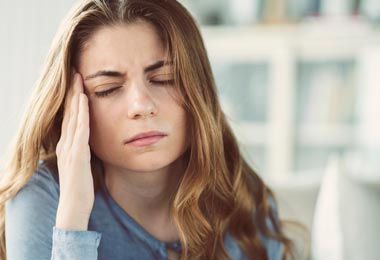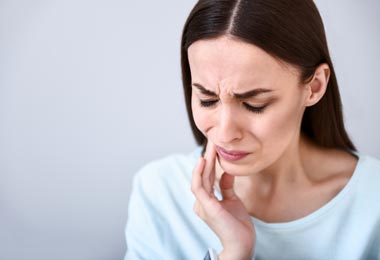Hangover Headache
While not a disease we treat at the Johns Hopkins Headache Center, delayed alcohol-induced headaches are extremely common, disabling and costly to society. This material is provided for general education purposes.
- How does alcohol affect the brain and the rest of the body?
- How little is enough to make an impact the next day?
- How long do the effects last?
- Are there any effective treatments?
How does alcohol affect the brain and the rest of the body?
Alcohol adversely affects the brain, the liver, the kidneys, the heart, blood vessels, the lining of the stomach, and various hormonal and regulatory systems. Even the word “intoxicated” indicates alcohol’s true nature: a toxic substance.
The first symptoms of ethanol intoxication on the brain are quite pleasurable for most people. You feel relaxed and happy, and with another drink or two you become boisterously enthusiastic — the life of the party. With increased alcohol consumption, your vision blurs, your reaction times slow, your perceptions are unreliable, and you become unsteady and uncoordinated. You start to lose your inhibitions, which can lead to another consequence of drinking: poor judgment. Speech begins to slur, and concentrating and “thinking straight” becomes impossible. At higher concentrations in the blood, hiccups, vertigo, confusion, lethargy, memory “blackouts,” vomiting, stupor, coma, slowed breathing and even death can result.
No one is exactly sure how ethanol causes its various effects, but once absorbed from the stomach into the bloodstream it can freely cross out of the blood and into nerve cells of the brain. Once in the brain it causes a chemical release that leads to pleasurable feelings, and it lessens inhibitions by depressing certain frontal lobe functions. Motor pathways become overactive, and blood sugar is processed less efficiently in the brain. As more and more ethanol molecules enter the membranes of the nerve cells, sedating effects develop. The effects of alcohol intoxication are relatively predictable based on measured blood alcohol content.
Some of these effects are caused by ethanol itself, and others are from an even more toxic byproduct of its metabolism called acetaldehyde. This chemical builds up in the blood as the liver breaks down the alcohol into a form that can be eliminated from the body.
The effects on other body systems are also important in the symptoms of alcohol intoxication. The kidneys increase urination substantially, leading to dehydration. Blood vessels in the skin dilate, causing flushing and increased cardiac output. The liver starts working overtime to detoxify the blood of ethanol and acetaldehyde, and cannot keep blood sugar adequately regulated.
Repeated drinking can lead to liver scarring, known as cirrhosis. Certain inflammatory chemicals increase in the blood and affect various natural hormonal pathways. The stomach lining may become irritated, increasing nausea and the chance of bleeding. The extra calories consumed often become converted into fat.
Many of these disturbances of the body’s natural physiology persist the next day, long after the alcohol is gone. Dehydration plays a significant role, as does acetaldehyde. Effects on hormones, blood chemistry, the sleep-wake cycle and inflammatory chemicals are also important in the thoroughly lousy feeling we have come to know as a hangover.
Most people are well aware of the presence of headache, malaise, diarrhea, loss of appetite, tiredness, nausea and sensitivity to light, sound and motion the day after binge drinking. What may be less well recognized is that manual dexterity, memory, reaction time, visual-spatial skills and attention are all adversely affected, even when your alcohol level has fallen back down to 0.
How little is enough to make an impact the next day?
Like so many other answers to science questions, “it depends.” Body weight and gender are very important factors. While five to eight drinks for the average man, and three to five drinks for the average woman, are enough to cause some degree of hangover, specific effects will vary greatly between individuals. Certain ethnic groups (Japanese, for example) have a genetically reduced ability to break down acetaldehyde, the main byproduct of alcohol, as it is first processed in the liver. This results in more reddening of the skin ("“Asian flush”) and hangovers at lower amounts of alcohol.
People prone to migraines tend to have more problems with hangovers. People who drink alcohol regularly, or those who are taking certain specific medications that affect liver enzymes, may metabolize alcohol more quickly, having fewer problems with intoxication and hangover as a result. Conversely, there are many medications that interfere with the breakdown of alcohol and acetaldehyde, worsening the consequences of drinking. A thin, Japanese teetotaling woman taking prescription painkillers will clearly have more problems with a few drinks than a 250 pound linebacker who regularly drinks four beers a night.
How fast you drink is also important. Most of us can break down about one drink’s worth of alcohol each hour. What you drink is far less important than how much, but there’s some evidence that darker beverages — whiskey, brandy, red wine, tequila — cause more problems than clear drinks such as gin and vodka. They are thought to contain chemicals called congeners that add to ethanol’s harmful effects.
How long do the effects last?
Hangovers can last up to 72 hours after drinking, but most are shorter in duration. Again it depends on how much was consumed, how dehydrated you became, nutritional status, ethnicity, gender, the state of your liver, medications, etc.
Are there any effective treatments?
If you’ve consumed too much alcohol and have to work the next day, what do you do? In short, you suffer, and so does your job performance. Thinking about calling in sick? You’ll be in good company. Estimates of lost revenues due to reduced job productivity and absenteeism from alcohol run as high as $148 billion a year in the U.S. alone. Much of this expense is related to hangovers in light to moderate drinkers.
A quick Google search for "hangover cure OR treatment OR remedy OR prevention” pulls up over 2 million webpages. There are countless commercial products (Cheerz, Chaser) and homemade recipes with wildly unsubstantiated and pseudoscientific claims of benefits. It is important to note that a recent study from the British Medical Journal concluded that there was essentially no substantial scientific evidence that any substance has proven effectiveness in preventing or treating a hangover. That being said, the authors themselves admit that very few well-designed scientific studies have ever been conducted on the subject, so it is more than possible that some of these unproven treatments might work.
There is some evidence that vitamin B6 taken before drinking can be mildly helpful. An anti-inflammatory drug called tolfenamic acid has been shown to be somewhat helpful when taken during alcohol consumption. While this drug is not available in the U.S., other related medications, including ibuprofen, naproxen, and prescription nonsteroidal anti-inflammatory drugs (NSAIDs) may be similarly helpful. However, when combined with alcohol they might increase the risk of stomach bleeding. Staying well-hydrated with plenty of water is helpful. Gatorade or other fitness drinks may be better than water alone, but there is no scientific proof. A chemical called N-acetyl-cysteine may be useful in detoxifying the body from acetaldehyde buildup, but this too is an unproven treatment. Light exercise may be helpful, provided you stay well-hydrated.
Here’s some advice on what to do after an evening of “overdoing it”:
- Avoid more alcohol (“hair of the dog”) — this will only increase your misery.
- Avoid further dehydration by drinking liquids (other than alcohol!) — water, chicken soup, Gatorade, whatever works for you.
- Avoid acetaminophen (Tylenol) at all costs — it can overtax your already hard-working liver, leading to dangerous swelling or even liver failure.
- Avoid unpalatable “recipes” that combine such ingredients as eggs, raw fish, Tabasco and sausage. You wouldn’t eat like that when you are at your best, so what makes you think you’ll stomach it when you’re hungover?
The very best prevention of a hangover? Don’t drink. The best cure? Time.
5 Ways to Be Kind to Your Liver

Your liver is often an unsung hero, fulfilling over 500 jobs without complaint — follow these five tips to avoid liver disease and keep yours running at maximum efficiency.




